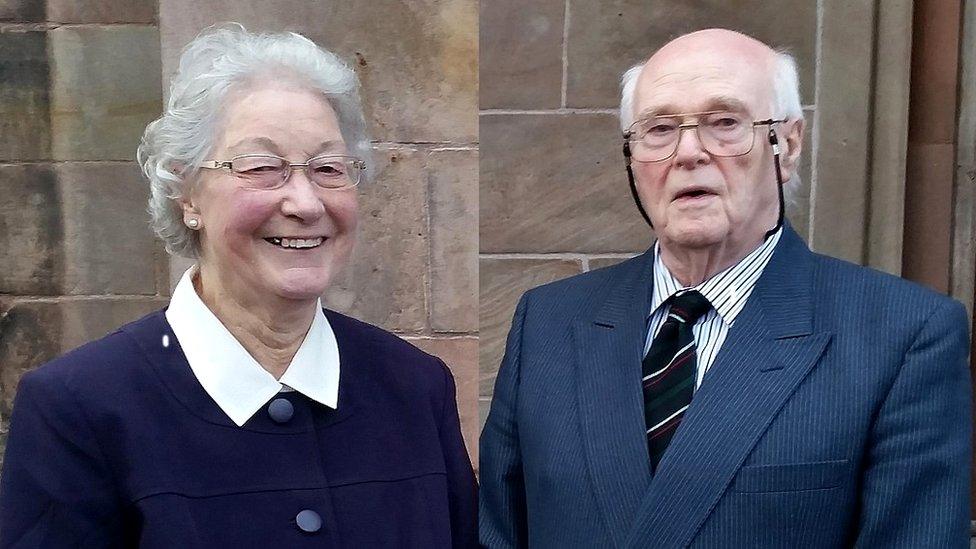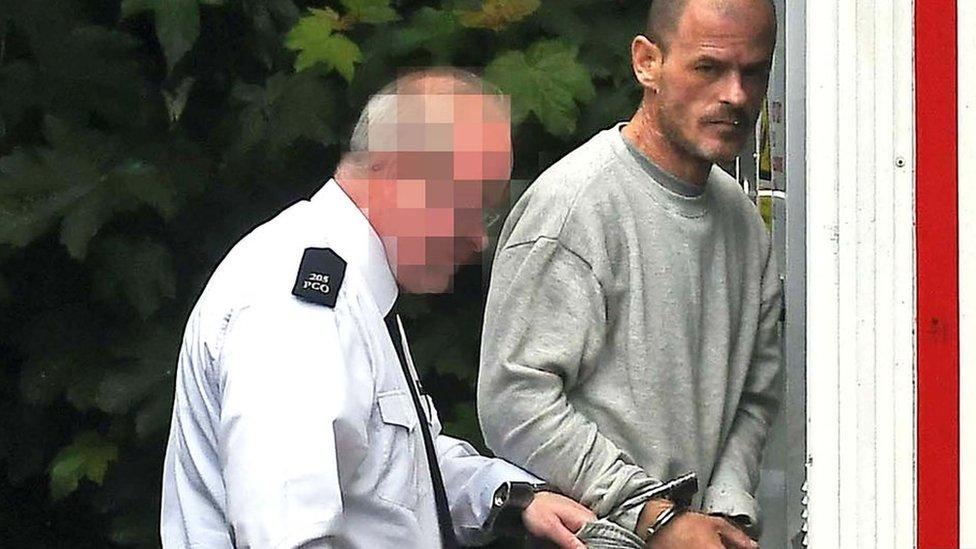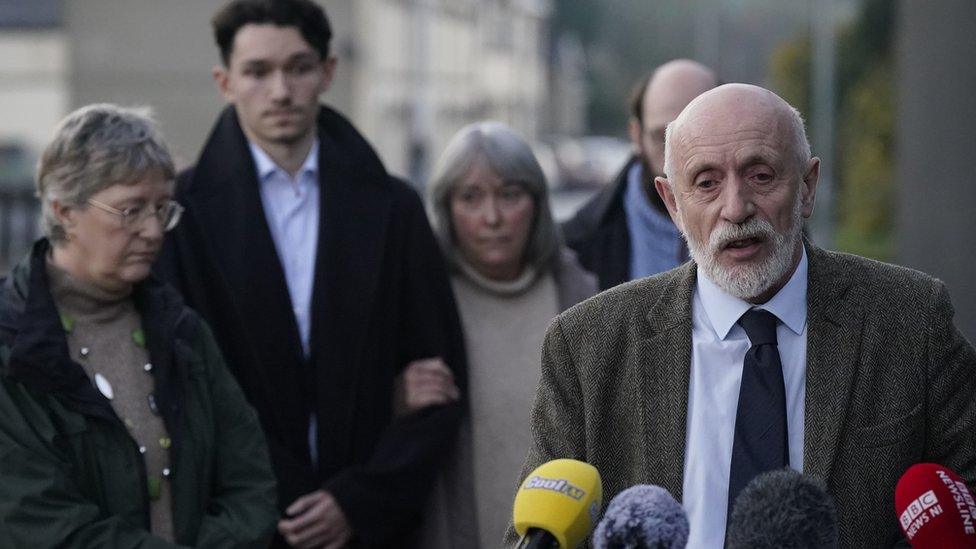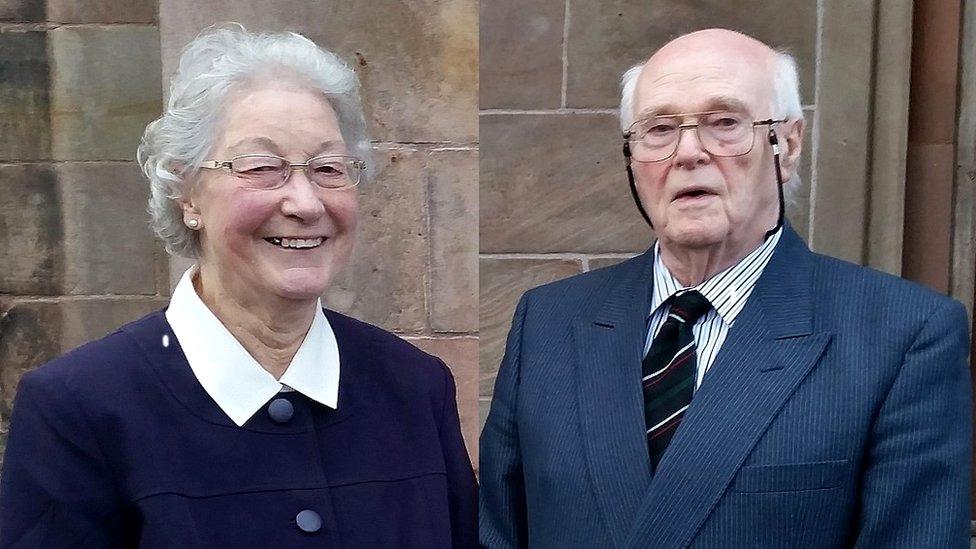Cawdery killings: Deaths of pensioners could be repeated, coroner warns
- Published

Marjorie and Michael Cawdery were killed in their home in Portadown in 2017
The chain of events which led to the brutal killings of two pensioners could happen again, a coroner has warned.
Maria Dougan said the deaths of Michael and Marjorie Cawdery were "entirely preventable".
The 83-year-olds were attacked at home in Portadown in County Armagh.
In the days before the attack, their killer Thomas Scott McEntee repeatedly came to the attention of police and health services as he battled severe mental illness.
He was later jailed for a minimum of 10 years for two counts of manslaughter with diminished responsibility.
Speaking outside Banbridge courthouse on Wednesday, the Cawderys' son-in-law Charles Little said there had been "utter chaos" within the police and health service which meant neither "had the ability to appreciate how unwell" McEntee was.
"What is really, really shocking is the utter chaos that appears to have existed in both the health service and police" - Charles Little
An inquest into their deaths was held in June and heard evidence from 40 witnesses.
It focused heavily on the interaction between McEntee, police and health services in Newry, Warrenpoint, Belfast and Craigavon in the days before the attack in May 2017.
Presenting her findings on Wednesday, Ms Dougan criticised police failures to enact mental health legislation on two occasions that would have seen McEntee taken to a place of safety.
The coroner said if police and staff at the Belfast and Southern health trusts had not missed multiple opportunities, McEntee would not have been in Upper Ramone Park, where the Cawdreys lived.
She also said there was a failure by the health services to fully evaluate McEntee and seek all available information.

Thomas Scott McEntee was jailed for the killings
The coroner further criticised the information exchange between police and health services in relation to McEntee and said greater training was required for police and medical staff when dealing with mental health staff.
A large body of work has been carried out by the Police Service of Northern Ireland (PSNI) and health trusts in addressing shortcomings, the coroner said.
"I can't be satisfied that this won't happen again. This must be a catalyst for change," she said.
"More work needs to be done to prevent families like the Cawderys suffering the same pain again".

Mr Little has called for a review of the legislation
Speaking after the coroner delivered her findings, Mr Little said the Cawdery family needed to time to digest what they had heard.
He said there should be a review of corporate manslaughter, gross negligence manslaughter and misconduct in a public office "[to] see if there can be reviews of that legislation which can accommodate situations like this and hold people and hold organisations to account.
He said there was no justice if "an ill man" was the only person held accountable for Mr and Mrs Cawdery's killings.
He said one issue that stood out above all others was that "most of the problems and most of the difficulties occur at interfaces" between organisations.
"Interfaces between the police and health service, interfaces between health trusts, interfaces between hospitals, interfaces between individual police officers," he said.
"We need a single mental health trust across the whole region that removes all those interfaces".
In a statement, the Southern Health and Social Care Trust said: "We accept the Coroner's findings and offer our deepest sympathies to the Cawdery family.
"We will review the Coroner's written findings when completed".
A spokesperson for the Belfast Trust said it was committed to learning from the coroner's findings.
"Belfast Trust would like to offer our sincere condolences to the Cawdery Family," they added.
Assistant Chief Constable Bobby Singleton said the PSNI acknowledged the "stark comments" of the coroner.
"The police service has, following our own internal review and a serious adverse incident review conducted by the health trust, already taken steps to address identified shortcomings in our handling of incidents linked to the murders of Michael and Marjorie," he said.
He said the police were now waiting for the full written verdict and would "immediately consider the findings and will work with our partners to ensure that any further recommended actions are addressed".
- Published28 June 2018

- Published22 June 2018

- Published12 June 2023

- Published23 May 2018
